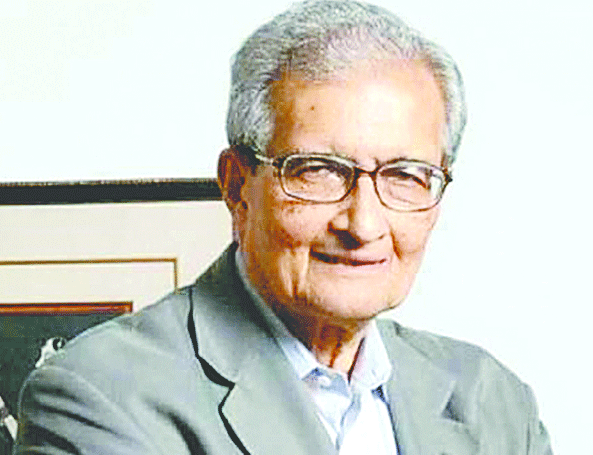POBNEWS24, Desk report Sep 27,2021 :Home in the World: A Memoir, a memoir by Nobel Prize-winning economist Amartya Sen, has recently been published. In the chapter titled ‘Bangla and the concept of Bangladesh’, various memories about Bangladesh and West Bengal of India have come up. Amartya Sen discusses various stages in the evolution of Bengali and Bengali. What was the nature of Hindu-Muslim relations in undivided Bengal, that relationship of harmony once became poisonous. Moving away from there, the united Bengalis gave birth to an independent country through 9 months of bloody liberation struggle. Amartya Sen has explored how this unity came about, where is the place of power. The second part of the three episodes of the chapter titled ‘Bangla and the concept of Bangladesh’ of his memoirs was published today.
We had many Muslim friends in Dhaka, Calcutta and Santiniketan. Naturally within the restrictions of the class we developed a great friendship. Most Muslim friends came from social positions like ours. However, they were a minority, far fewer than the Hindu students from wealthy families. Through my own visits and discussions with my family, I realized that the number of Muslims among the elite who passed the university, among government professionals and doctors, professionals like lawyers, and the wealthy middle class was innumerable.
In this respect the situation here was different from that in northern India. Muslims were well represented among the elite in northern India. When I went to the northern city of Lucknow, I always caught this contrast. I used to go there often because I had Mamta Aunty (I have Labu Aunty). My uncle Shailen Dasgupta was a professor of history at the University of Lucknow. When I was a schoolboy, I loved touring the campus. But I had a big reason for choosing Lucknow, spending time there with my cousin Somashankar (Bachchuda) and cousins Ilina and Sumna.
I was also fascinated by the rich culture of Lucknow. The upper class Muslims were the bearers of this culture. The upper class of Lucknow traditionally belonged to the Muslim community. Not only the rulers of the time but also the Nawabs were Muslims. Satyajit Ray’s famous film Shataranj Ke Khiladi (198) depicts the luxurious and peaceful life of the elite Muslims of Lucknow.
Muslim rule
There were also Muslim Nawabs in Dhaka, but the vast majority of Bengali Muslims outside of their small group were not very wealthy. Although Muslim kings ruled Bengal for centuries, it was the opposite. It does not seem that those Bengali rulers wanted to remove the Hindu upper and middle class from their comfortable position or force them to convert to Islam.
Hindus did not have to renounce their religion to serve in the courts or in the army under Muslim rulers. During the swearing-in ceremony of the Mughal army, Muslim army officers took oath in the name of Allah and Hindu officers took oath in the name of Vishnu.
It was a common policy of the Mughals to adopt many religions. It started in the second half of the sixteenth century from the time of Emperor Akbar. (When Giordano Bruno was burned at the Campo de Fiori in Rome for blasphemy, Akbar was lecturing on the importance of religious tolerance in Agra). Although many Hindu historians have been critical of the post-Mughal rule, especially of the ‘communal’ character of Emperor Aurangzeb a century later, Mohan Sen objected to my knowledge of that history.
When I was growing up in those years of communal strife, he called it ‘fictional history.’ Among the court and close associates of Aurangzeb were a large number of Hindus. Kshitij Mohan used to bring the issue to the fore. I think this is why he saw the role of sectarian anti-Muslim history in increasing communal divisions and inciting discontent and violence in India.
Even before the Mughal rulers of the sixteenth century, the Muslim rulers of Bengal (Pathans from Afghanistan) kept Hindus in the courts and in the army. However, there were some ‘Ashrafs’ who claimed that their ancestors came from the west of the Khyber Pass, meaning that the mainland of the Muslims came from Persia, Arabia or the Turkish Empire. However, these immigrant Ashrafs were not in large numbers.
Permanent settlement
The distance between Hindus and Muslims increased during the British rule. It was first started under the East India Company. In 1793, Lord Cornwallis declared a permanent settlement. Under this the practice of giving revenue to the government permanently by the zamindars was introduced. They got the opportunity to increase the rent as they wished.
Many of these zamindars were Hindus. They formed a class who lived on the income of the land. However, they lived far away and were not involved in farming themselves. The tenants of the zamindars’ rents were severely exploited, most of them Muslims.
The country’s economy was severely damaged by the permanent settlement. The reason was that almost all the incentives given to agricultural development in this system were stopped and inequality on the basis of land ownership was established.

Muslims are victims of injustice
In a few years in Calcutta I came to know about a large number of Hindu zamindars. They were small and big zamindars. They used to get regular money from that land. Historian Ranjit Guha (later a friend and colleague) has researched the perpetual settlement of a system full of injustice. He admits that the townspeople, as a member of this zamindar class (absent on land), themselves benefited from this arrangement:
The author (Ranjit Guha) in his youth, like many others of his generation in Bengal, grew up in the shadow of a permanent settlement. Like his family, his livelihood came from distant talukas, where they never went. His education was based on what was needed to appoint a cadre officer of a colonial administration from among the descendants of the beneficiaries of Lord Cornwallis’ permanent settlement. The world of his culture was based on the values of the middle class, which depended on the butter obtained from the land. There was no connection between the original culture and the common peasant culture.
Another important historian Tapan Roy Chowdhury also described his experience as a member of the zamindar family. This member of the zamindar family of Barisal in present day Bangladesh wrote:
‘Zamindars mean royal honors from the poor plowing peasants …. When we confronted the raiyats, they acted as if they were our gods …. He has done it. ‘
Some of these raiyats were lower class Hindus. Many — in fact most of them were Muslims. Due to this economic inequality, it was very easy for Bengali Muslims to be drawn into the politics of hatred. The temporary success of the Muslim League in Bengal in the mid-forties, which was important for the partition of India, had a strong connection with the ownership of this land.
The great statesman of Bangladesh
A lot has changed in Bengali since I was in school. But the thing that has completely changed the situation is the end of the injustice of the permanent settlement. Tapan Roy Chowdhury describes how the lavish lifestyle of rich zamindars disappeared overnight in 1947-48. Needless to say, this overnight shift created a Bangladesh with a strong commitment to secularism, as it probably did not in the 1940s. However, the rest of the story remains, especially under the leadership of the great statesman of Bangladesh Bangabandhu Sheikh Mujibur Rahman, secular politics developed tremendously.
At one time the ‘land question’ was the main cause of dissatisfaction among Muslims. That is why the secularism of AK Fazlul Huq was stuck. But at this point the matter suddenly went out of the discussion. A place for a more integrated Bengali movement was created in the then East Pakistan. The beginning of the Bengali language movement in 1952 was less than five years after the partition of India and the establishment of East Pakistan.
The need for a secular and democratic Bangladesh was to develop constructive politics. It was done in those years with many adversities.
This required a visionary and positive outlook, which came from Bangabandhu Sheikh Mujibur Rahman. Importantly, Bangabandhu was able to capture the special history of communal harmony of the Bengalis that has been going on for centuries. He also understood the causes of the recent communal riots.
When I think of the cultural history of the Bengalis, be it Dhaka, Calcutta or Santiniketan — wherever they are, these issues come up relevantly. In particular, the question of whether we can speak properly of the ‘Bengali people’ would make things clearer.
A Bengali identity is always important to me. That is considering my profession, politics, nationality, humanity and all my other involvement. Today’s Bengali identity is a mixture of different cultures.
In his Hibbert speech in the early 1930s, Rabindranath Tagore told the audience at Oxford that he came from a fusion of three cultures — Hindu, Muslim and British. By this statement he did not confine himself to any particular group; Rather, it reveals a proud celebration of a wider range of acquaintances than small boundaries.
Recognition of political and cultural secularism does not take away the religious identity of a Bangladeshi Muslim. It is perfectly consistent with the claim that people’s religious identities may differ from their political identities. The same can be said of a Bengali Hindu, whether he is in Bangladesh or India, wherever he may be.







